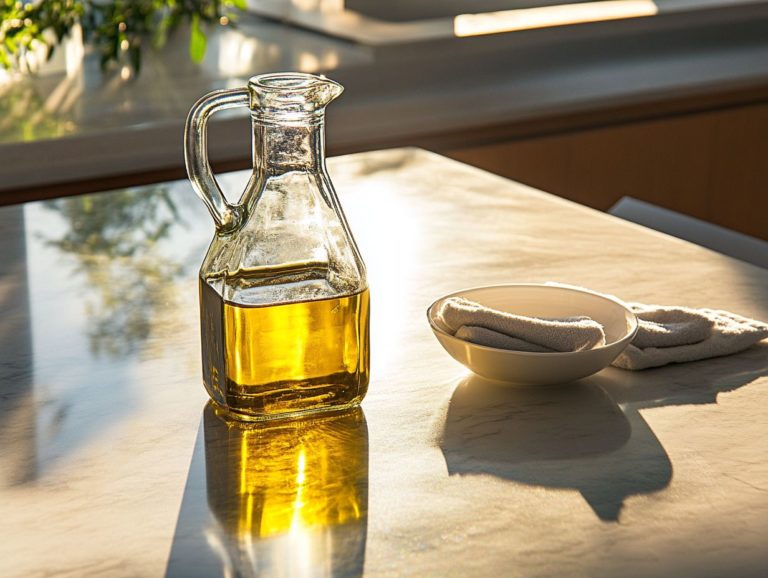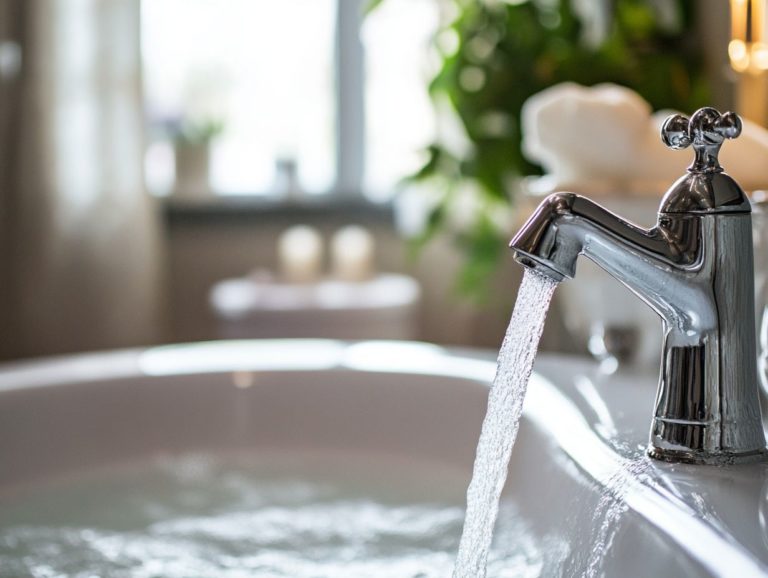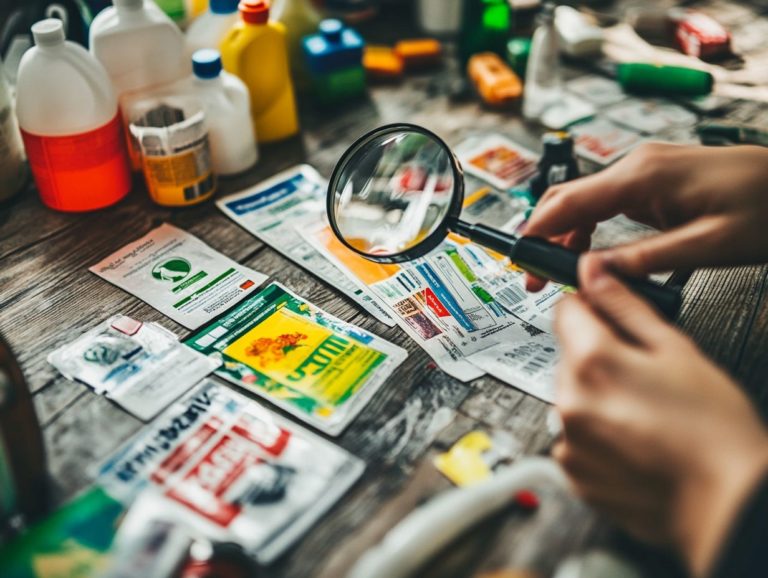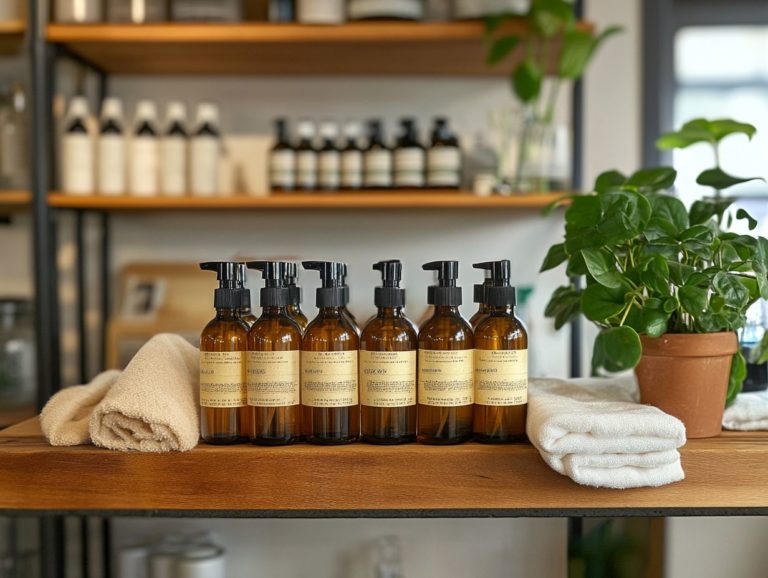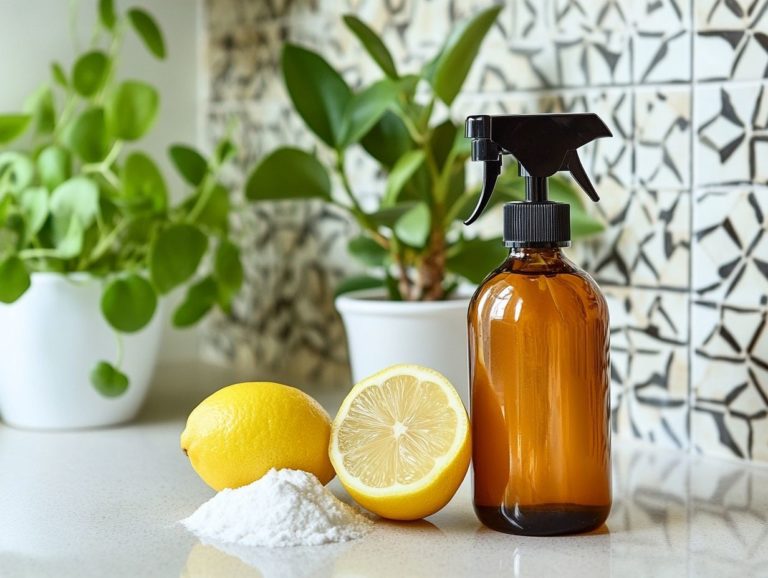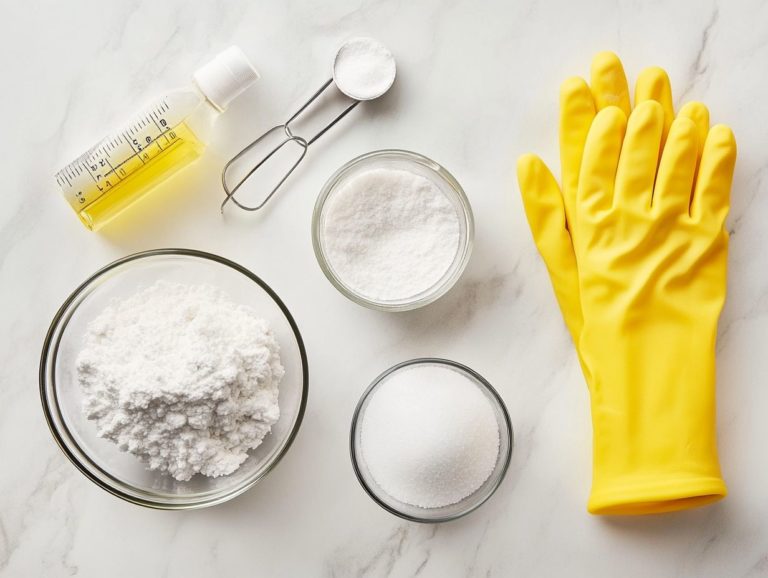How to Make a Natural Floor Cleaner?
Choosing a natural floor cleaner means caring for your home and health. It helps create a healthier living space for you and your loved ones.
Using a DIY floor cleaner can also help achieve this goal. By utilizing simple ingredients like distilled white vinegar, essential oils, and baking soda, you can create an effective cleaner that is safe for both your family and pets.
This guide reveals why natural cleaners are a game changer. It offers easy-to-follow cleaning recipes and demonstrates how to use them effectively to keep your floors gleaming.
Prepare to uncover practical tips, effective cleaning solutions, and delightful aromas that will elevate your cleaning routine to a whole new level!
Contents
- Key Takeaways:
- Why Use a Natural Floor Cleaner?
- What Ingredients Are Needed for a Natural Floor Cleaner?
- How to Make a Basic Natural Floor Cleaner?
- What Other Natural Floor Cleaner Recipes Can Be Made?
- How to Use a Natural Floor Cleaner?
- Frequently Asked Questions
- What is a natural floor cleaner?
- Why should I make my own natural floor cleaner?
- What ingredients can I use to make a natural floor cleaner?
- How do I make a basic natural floor cleaner?
- Can I use a natural floor cleaner on all types of flooring?
- Are there any precautions I should take when using a natural floor cleaner?
Key Takeaways:
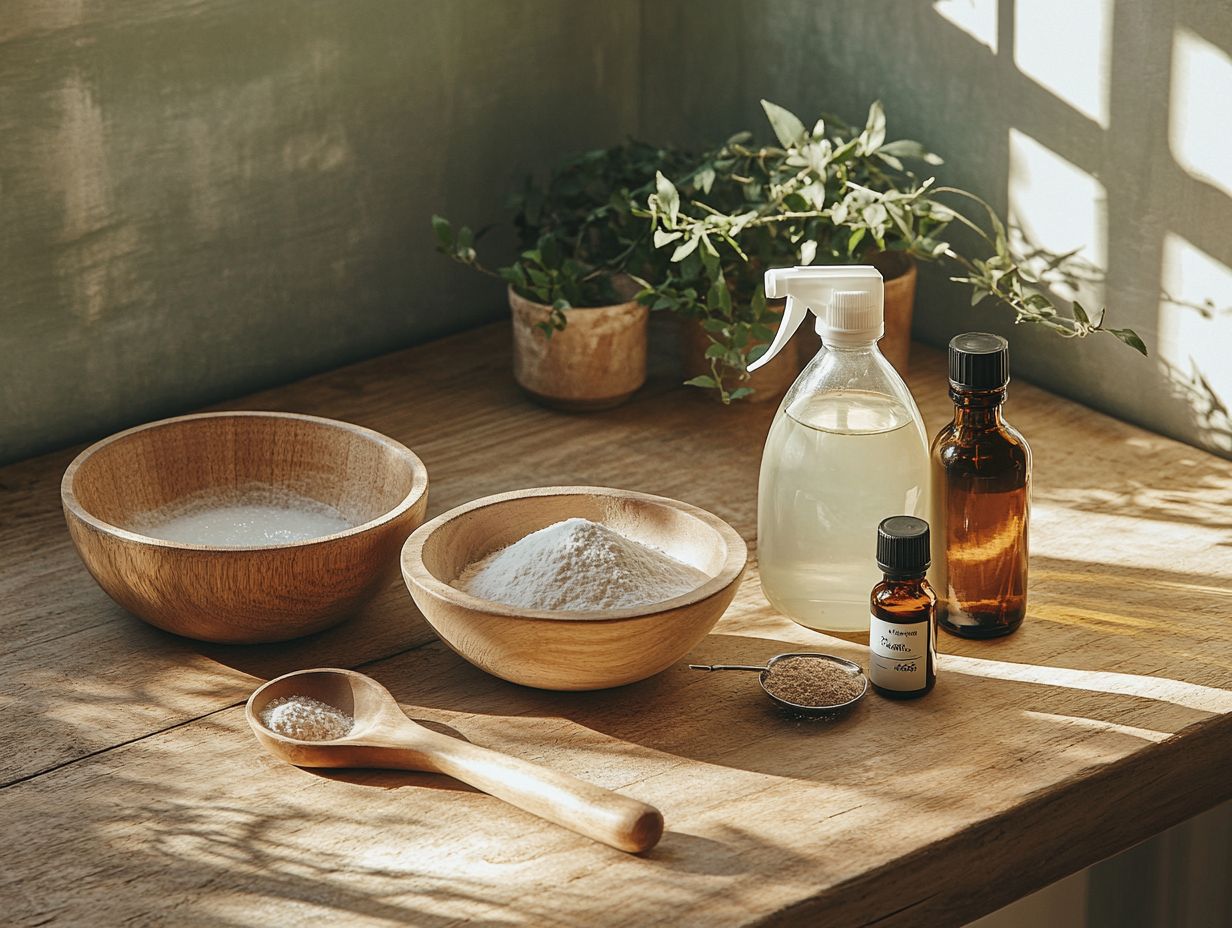
- Choose natural floor cleaners or a non-toxic floor cleaner to reduce contact with harmful chemicals and protect the environment.
- Make a basic homemade floor cleaner with distilled white vinegar, essential oils, and baking soda for a safe and effective cleaning solution.
- Experiment with different natural floor cleaner recipes, such as citrus, tea tree and lavender, or lemon and rosemary, for a customized cleaning experience.
Why Use a Natural Floor Cleaner?
Choosing a natural floor cleaner comes with a host of benefits, especially for those who value health and environmental safety in their cleaning routines. Traditional commercial cleaners often pack a punch with harsh chemicals that can pose risks to both your well-being and the planet. A DIY floor cleaner can help you avoid these risks.
In contrast, a homemade floor cleaning solution crafted from natural ingredients can tackle grime and dirt effectively without jeopardizing your health. Natural cleaners are versatile. They work well on various surfaces like hardwood, laminate, and ceramic tile. This means you can enjoy an all-purpose cleaning solution that enhances the cleanliness of your home while aligning with your values.
What Ingredients Are Needed for a Natural Floor Cleaner?
Crafting your own homemade floor cleaner is a breeze with just a handful of simple ingredients that you likely already have on hand. This makes it an ideal solution for anyone eager to embrace more natural cleaning methods.
Among the key players in your cleaning arsenal, distilled white vinegar stands out as a formidable cleaning agent, celebrated for its ability to kill germs. Rubbing alcohol comes into play as well, boosting your cleaner with extra disinfecting power. These ingredients are essential in any homemade floor cleaning solution.
To elevate the fragrance and enhance the overall cleaning experience, consider adding essential oils. This allows you to tailor your cleaning solution to specific surfaces, whether it s hardwood floors or laminate floors, ensuring you effectively conquer dirt and grime with style.
1. Vinegar
Distilled white vinegar is an essential ingredient in many natural cleaning recipes, renowned for its versatility and effectiveness in eliminating grime and unpleasant odors from a variety of surfaces. This powerful ally works wonders on both hardwood and laminate floors, effortlessly cutting through dirt to deliver a streak-free shine.
Its natural acidity is adept at breaking down tough stains and disinfecting surfaces. This makes it the ideal choice for anyone committed to maintaining a clean and healthy home environment. It is a key component in any home cleaning solutions.
It excels at tackling soap scum and mineral deposits, proving particularly useful in bathrooms and kitchens. As a non-toxic alternative to harsh chemical cleaners, distilled white vinegar provides peace of mind for those concerned about indoor air quality and minimizes exposure to allergens and harmful substances.
Whether you re wiping down countertops, freshening up upholstery, or deodorizing carpets, this unassuming vinegar demonstrates its remarkable ability to create a safer, more pleasant living space without compromising on cleanliness. Don’t miss out on transforming your cleaning routine with this simple, effective ingredient!
2. Essential Oils
Essential oils do more than just elevate the aroma of your homemade floor cleaners; they also offer a range of cleaning benefits that make them a favorite among natural cleaning enthusiasts. These concentrated plant extracts effectively combat odors and infuse your cleaning solution with germ-fighting properties. They also help create a more inviting atmosphere in your home.
By choosing specific essential oils, like tea tree or lavender, you can customize your homemade floor cleaner to suit its effectiveness and your desired fragrance. This ensures an enjoyable cleaning experience.
Oils such as lemon and eucalyptus bring a refreshing scent and have natural degreasing abilities. They excel at tackling stubborn stains and grime. In the realm of natural cleaners, these essential oils are vital as they replace harsh chemicals found in traditional products, promoting a healthier indoor environment.
Incorporating essential oils into your cleaning routine helps purify the air and can even help you feel better. The versatility of these oils allows endless customization, so you can craft a cleaning solution that matches your preferences while ensuring the safety of your family and pets.
3. Baking Soda
Baking soda is a fantastic addition to your collection of natural cleaning solutions. Its ability to absorb moisture and neutralize odors makes it perfect for various cleaning recipes. When combined with other natural ingredients, baking soda boosts the effectiveness of your homemade floor cleaner, giving you extra power to tackle tough grime and stains. It s especially effective for removing carpet stains. When paired with vinegar, it creates a delightful fizzy reaction that helps lift dirt from surfaces.
Its gentle abrasive nature makes it ideal for scrubbing away stubborn marks without risking damage to delicate materials. You can confidently use it on a wide range of surfaces. Adding baking soda to your cleaning routine is easy; just mix it into your laundry for fresh-smelling clothes or sprinkle it on carpets before vacuuming to get rid of lingering odors.
You can even place open containers of baking soda in your fridge or shoe cabinets to act as effective deodorizers. Its versatility and ease of use truly make baking soda an essential ingredient for anyone looking to maintain a clean and inviting home environment.
How to Make a Basic Natural Floor Cleaner?
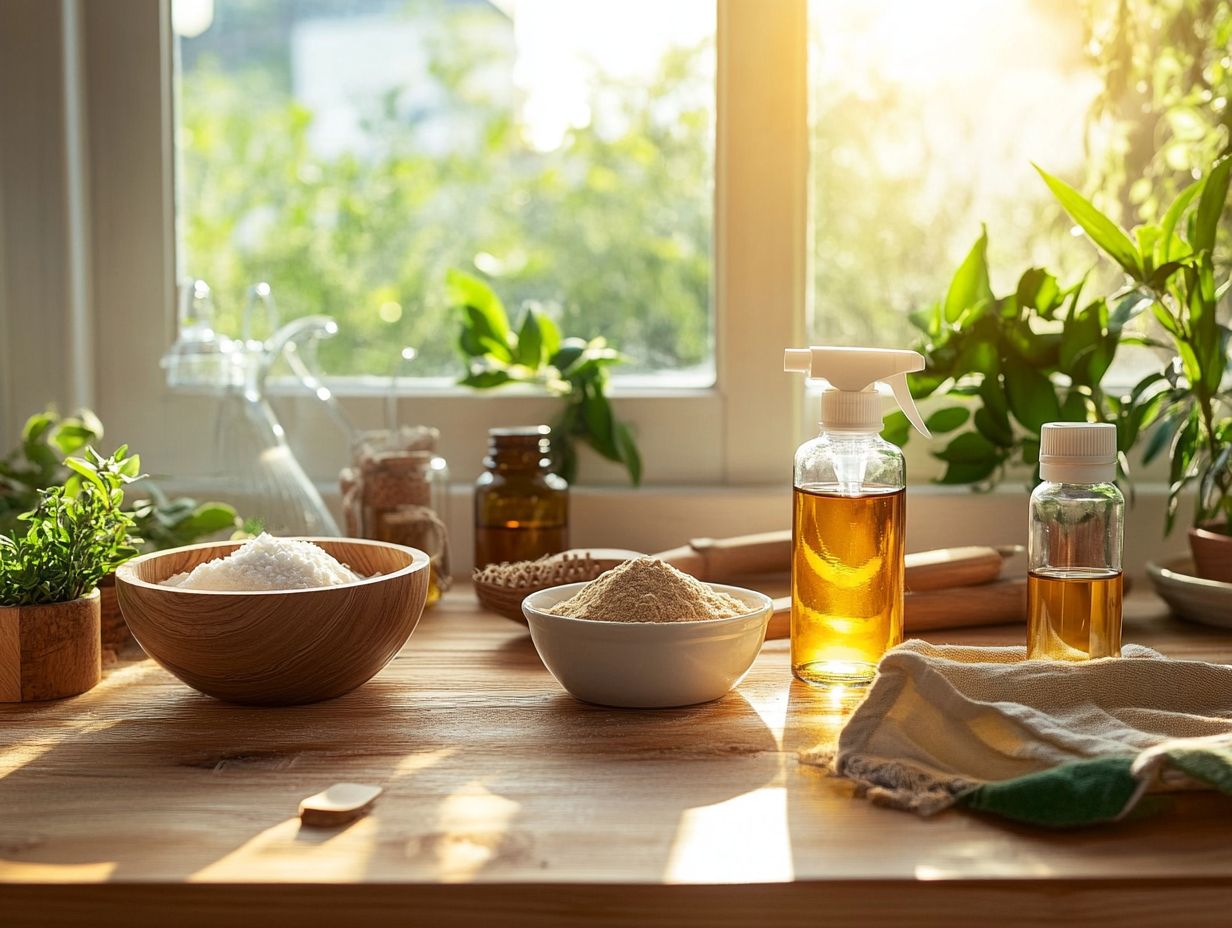
Making your own natural floor cleaner is simple and fun! It s also a cost-effective solution that lets you customize your cleaning experience.
The secret is in blending the right proportions of natural ingredients, such as distilled white vinegar, water, and essential oils. This combination creates an effective cleaner that tackles grime on various surfaces, including hardwood and laminate floors.
By following simple cleaning instructions, you can ensure that your homemade cleaner is both highly effective and safe for your family and pets.
1. Mix Vinegar and Water
The first step in crafting your own natural floor cleaner is to blend distilled white vinegar with water. This mixture serves as the cornerstone of your cleaning solution. Aim for a balanced ratio of one part vinegar to one part water, resulting in a powerful yet safe mixture that effectively tackles dirt and grime across various surfaces. This solution not only sanitizes your floors but also gives them a natural shine, all without the need for harmful chemicals.
To optimize the effectiveness of your cleaning solution, measure your ingredients accurately. An improper ratio can lessen its cleaning power. If you face tougher stains, consider increasing the vinegar concentration to two parts vinegar and one part water for more potency. Always conduct a quick test on a small, inconspicuous area first, as different flooring materials may react differently to vinegar.
By following these guidelines and taking the necessary precautions, you can harness the incredible cleaning power of this natural solution.
2. Add Essential Oils for Scent
To elevate the aroma and cleaning effectiveness of your natural floor cleaner, adding a few drops of your favorite essential oil into the vinegar and water blend is crucial. This simple addition enhances your cleaning experience and helps kill germs, depending on the oil you choose.
Popular options include lavender for its soothing fragrance, tea tree for its powerful antimicrobial properties, and lemon for a zesty, refreshing scent.
Integrating essential oils can truly transform your cleaning routine into a delightful experience. For example, eucalyptus oil fills the space with a crisp, invigorating aroma and boasts impressive antifungal qualities, making it perfect for high-moisture areas like bathrooms and kitchens.
Citrus oils, such as orange or grapefruit, uplift your mood and instill a sense of cleanliness in your home. When selecting essential oils, think about their unique characteristics and how they align with your cleaning objectives. This is your chance to create a cleaner that smells exactly how you want!
3. Optional: Add Baking Soda for Extra Cleaning Power
If you’re aiming to enhance the cleaning power of your homemade floor cleaner, consider adding baking soda. This natural wonder significantly boosts your cleaning solution’s ability to tackle dirt and grime, particularly when faced with those pesky, stubborn stains.
Incorporating baking soda not only amplifies the effectiveness of your cleaner but also harnesses its deodorizing magic, leaving your floors smelling delightfully fresh. To create your homemade solution, simply combine equal parts of white vinegar and water, then stir in two tablespoons of baking soda. You can also add a bit of dish soap for extra cleaning power.
The fizzy reaction between the vinegar and baking soda works wonders, breaking down tough grime with ease. Once the mixture settles, get ready to enjoy fresh, clean floors!
Just a quick reminder: avoid mixing the solution in a closed container, as the carbonation needs some space to expand. With this method, your DIY floor cleaner will have cleaner, fresher floors in no time, transforming your cleaning routine into a breeze!
What Other Natural Floor Cleaner Recipes Can Be Made?
Beyond the foundational recipe for a natural floor cleaner, a world of alternative cleaning formulas awaits your discovery, each tailored to meet your specific needs, preferences, or flooring types. You might even consider using DIY floor cleaner methods to save on costs and ensure all-natural ingredients.
By exploring a variety of ingredients think essential oils, citrus fruits, and other natural components you can craft unique blends that not only clean effectively but also elevate the ambiance of your home. Additives like lemon juice or olive oil can offer additional benefits like polish and shine.
These delightful variations give you the power to tackle various cleaning challenges while ensuring that your solutions remain safe and non-toxic. Using simple ingredients like hydrogen peroxide or borax can make your cleaner powerful and effective.
Try these tips today and enjoy a brighter, fresher home!
1. Citrus Floor Cleaner
A citrus floor cleaner is an effective choice that utilizes the remarkable cleaning properties of citrus fruits like lemon and orange, paired with essential oils. The natural acidity of citrus breaks down grime while leaving a fresh scent that transforms your cleaning experience. To make your own citrus floor cleaner, combine the juice of these vibrant fruits with vinegar and water, adding essential oils for an extra punch of antibacterial goodness. Use a microfiber mop to apply the solution evenly.
This easy DIY recipe will help you keep your floors spotless and reduce exposure to toxic chemicals found in commercial cleaners.
Start by gathering your ingredients:
- Freshly squeezed juice from lemons or oranges
- White vinegar
- Water
- Your favorite citrus essential oil, like eucalyptus or tea tree
Once you have everything ready, combine these components in a spray bottle, give it a good shake, and enjoy a sparkling clean floor infused with a zesty aroma that elevates any atmosphere. This natural cleaner enhances your indoor air quality and offers an eco-friendly alternative for those mindful of chemicals in their homes. Using a Makers Mop can help achieve the best results.
2. Tea Tree and Lavender Floor Cleaner
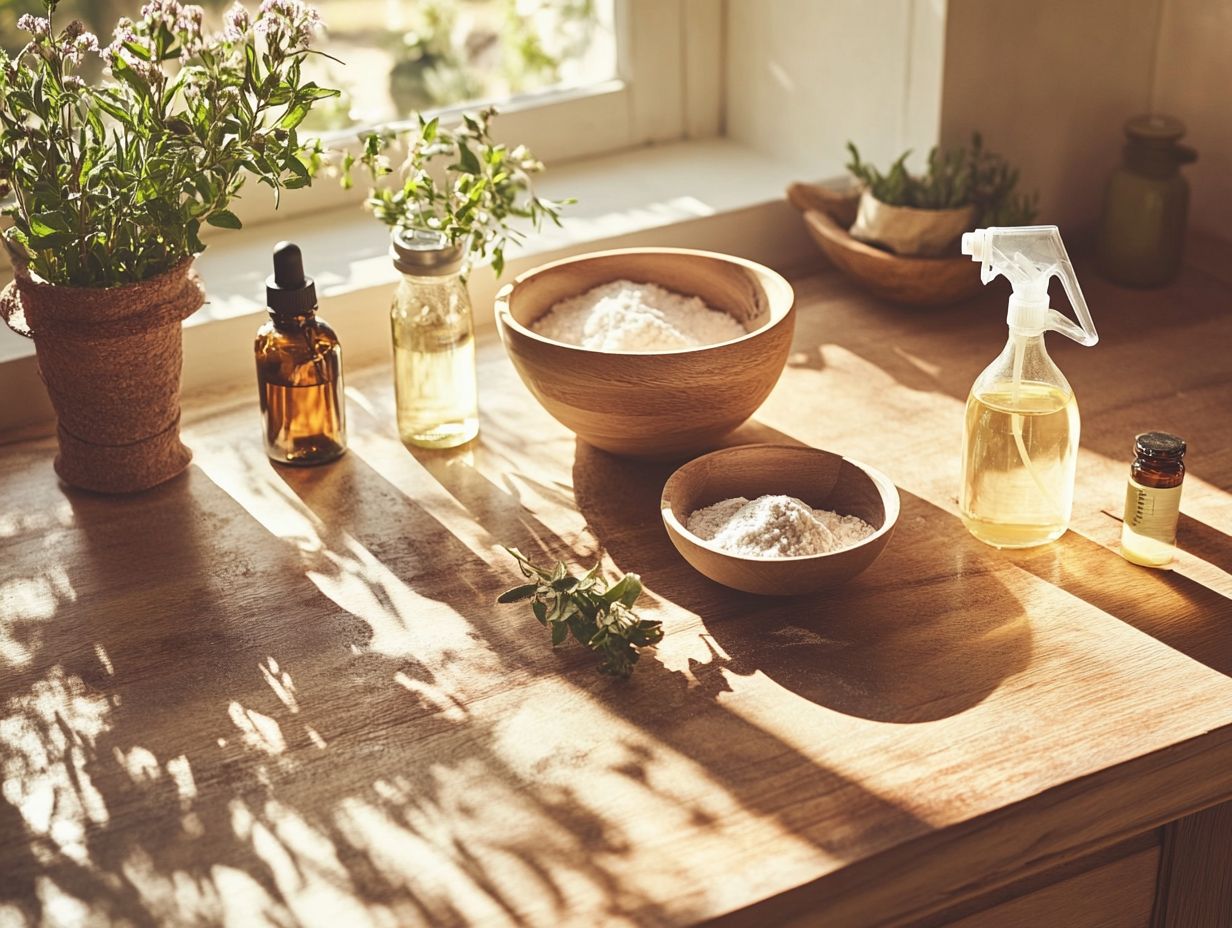
A blend of tea tree and lavender oil creates a natural floor cleaner that combines the disinfecting power of tea tree oil with the soothing aroma of lavender. This cleaning solution sanitizes your floors and fosters a serene atmosphere in your home. It also works as an all-purpose cleaner for various surfaces.
To make this cleaner, mix water, a cup of vinegar, and a few drops of both tea tree and lavender essential oils.
This strong mix effectively tackles unwanted germs and bacteria lingering in your living spaces, making it suitable for households with children and pets. The antibacterial qualities of tea tree oil keep surfaces clean, while lavender oil adds a delightful fragrance and promotes relaxation, turning cleaning into a more enjoyable task.
This eco-friendly floor cleaner is easy to make, budget-friendly, and free from harsh chemicals, ensuring a safe environment without sacrificing cleanliness or ambiance.
3. Lemon and Rosemary Floor Cleaner
Mix lemon and rosemary in your homemade floor cleaner to deliver impressive cleaning power and fill your space with a refreshing aroma. Lemon acts as a natural degreaser, while rosemary offers antibacterial qualities, enhancing the overall effectiveness of your cleaning solution. You can also add grout cleaner for tougher areas.
To make this cleaner, mix fresh lemon juice with water, vinegar, and a few sprigs of rosemary.
By using these natural ingredients, you create a safe cleaning alternative for your home and the environment. Enjoy the mood-lifting qualities of citrus along with the herbaceous scent of rosemary. The acidity of lemon helps break down tough stains, while rosemary’s calming fragrance eases stress during cleaning. This combination also aids in grime removal for a spotless finish.
Try making these cleaners today for a fresher home!
How to Use a Natural Floor Cleaner?
To use a natural floor cleaner effectively, understanding the right techniques and tools is key to keeping your floors in pristine condition. Proper moisture management is also crucial to prevent warping and damage.
Start by preparing your space: clear away furniture and any obstacles before diving in. Gather your cleaning supplies, including a vacuum or dust mop for pre-cleaning and a microfiber mop for applying your cleaner. Quality cleaning equipment enhances overall effectiveness.
Follow the right cleaning steps to boost your homemade cleaner’s effectiveness. This ensures your flooring stays in great shape.
1. Sweep or Vacuum the Floor
Before applying your natural floor cleaner, sweep or vacuum the floor to eliminate any loose dirt, dust, or debris that could interfere with cleaning. This preliminary step is crucial for hardwood and laminate floors, as lingering particles can scratch or damage the surface during mopping.
A thorough pre-cleaning allows your homemade cleaner to penetrate and lift dirt more effectively. For tough stains, consider using a homemade floor cleaning solution with added hydrogen peroxide or borax.
When you sweep, use a soft-bristled broom designed for hard surfaces; this captures fine dust without scratching your floors. If you prefer vacuuming, choose a vacuum cleaner with a brush roll that effectively clears out dirt while being gentle on the surface. Pay special attention to corners and beneath furniture, where dust likes to hide.
By diligently pre-cleaning, you extend the life of your floors and create a more hygienic environment. This allows your natural floor cleaner to work its magic more effectively.
2. Mop with the Natural Floor Cleaner
Once you’ve pre-cleaned, grab your natural floor cleaner and a microfiber mop for the best results. Microfiber mops are fantastic for picking up dirt and spreading the cleaning solution evenly, ensuring every nook and cranny is reached without leaving streaks.
Dip the mop into the cleaning solution, wring out the excess, and start mopping in sections for complete coverage. Using the right cleaning tools makes this process more efficient.
Employ a figure-eight motion to cover more ground while effectively lifting grime. This technique lets the microfiber fibers capture and lock away dirt without scratching your floor, ensuring those often-neglected corners and edges get the attention they deserve.
Rinse the mop head frequently and wring it out to keep the cleaning solution effective and prevent muddy streaks. A microfiber mop is also great for removing grime, and its eco-friendly design helps reduce the need for harsh chemicals. This makes it an excellent choice for maintaining a healthy home environment.
Don’t wait start cleaning your floors naturally today! Regular maintenance will keep your home fresh and inviting.
3. Rinse with Water
After you mop with your natural floor cleaner, it’s crucial to rinse the floor with clean water. This step removes any remaining cleaning solution and prevents residue buildup, which is particularly important for surfaces like hardwood and laminate. Leftover residue can lead to dullness or stickiness over time.
Take a clean mop or cloth, dampen it with water, and wipe down the floors to achieve a fresh and pristine finish. Using a vacuum or dust mop beforehand ensures that loose particles are not left behind.
Rinsing enhances the visual appeal of your floors and helps them last longer. When cleaning agents remain on the surface, they tend to attract dirt and grime more quickly, creating an endless cycle that undermines your cleaning efforts. Proper moisture control keeping the right amount of water on your floors to avoid damage can further enhance the process.
Rinsing is crucial for maintaining your floors’ protective finish, preventing potential damage over time. For the best results, consider changing the rinse water regularly. This avoids redistributing any dirt particles back onto the floor and keeps your floors shiny and clean.
By adopting this simple yet effective strategy, you can ensure your floors look immaculate and inviting, making a noticeable difference in their overall upkeep. For a more thorough clean, consider incorporating homemade floor cleaning methods using commonly available ingredients.
A quick tutorial on using natural floor cleaners.
Using DIY floor cleaner solutions can help save money and reduce exposure to harsh chemicals. Explore using cleaning equipment like microfiber mops and vacuum or dust mop to enhance your cleaning routine.
Frequently Asked Questions
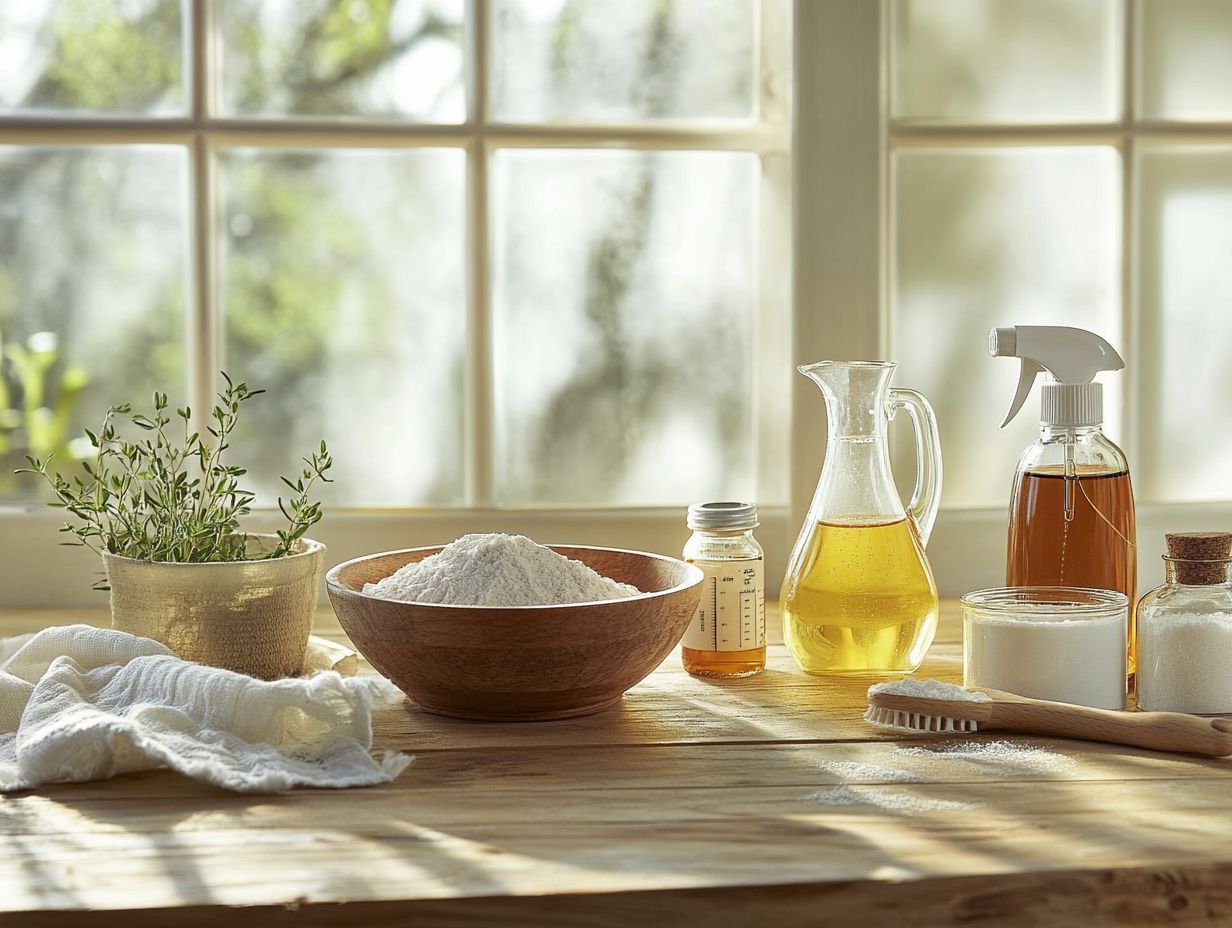
What is a natural floor cleaner?
A natural floor cleaner, such as a homemade floor cleaner, is made with all-natural ingredients and does not contain any harsh chemicals or toxins. It is a safe and environmentally-friendly alternative to traditional floor cleaners.
Why should I make my own natural floor cleaner?
Making your own natural floor cleaner allows you to control the ingredients and avoid using harmful chemicals that can affect your health and the environment. It is also a cost-effective option since most natural ingredients are affordable and easily accessible.
What ingredients can I use to make a natural floor cleaner?
Common ingredients in natural floor cleaners include vinegar, baking soda, essential oils, lemon juice, and castile soap. You can also add water to dilute the solution for easier application. Products like Sal-Suds and BioKleen can be incorporated for enhanced cleaning power.
How do I make a basic natural floor cleaner?
To make a basic natural floor cleaner, mix equal parts of white vinegar and water in a spray bottle. You can also add a few drops of your preferred essential oil for a pleasant scent. Shake well before use. For best results, consider using a tool like the Makers Mop to apply your homemade solution.
Can I use a natural floor cleaner on all types of flooring?
Yes, most natural floor cleaners are safe to use on all types of flooring such as hardwood, laminate, tile, and vinyl. However, it is always best to test the solution on a small inconspicuous area first to ensure compatibility. Homemade floor cleaning solutions are particularly versatile and effective on various surfaces.
Are there any precautions I should take when using a natural floor cleaner?
While natural floor cleaners are generally safe to use, it is important to avoid mixing different ingredients, as they may react and create harmful fumes. Also, be mindful of any allergies you may have to certain ingredients and always ventilate the area when using the cleaner. Products like BioKleen and Sal-Suds should be used as directed to ensure safety.
Start cleaning your floors with these natural methods today for a healthier home!

